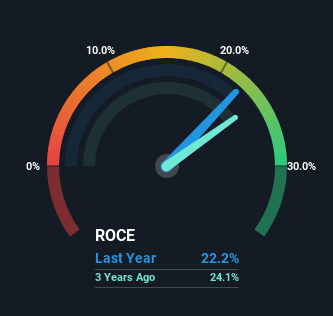Some Investors May Be Worried About Galaxy Surfactants' (NSE:GALAXYSURF) Returns On Capital

If we want to find a potential multi-bagger, often there are underlying trends that can provide clues. Firstly, we'd want to identify a growing return on capital employed (ROCE) and then alongside that, an ever-increasing base of capital employed. Basically this means that a company has profitable initiatives that it can continue to reinvest in, which is a trait of a compounding machine. Having said that, while the ROCE is currently high for Galaxy Surfactants (NSE:GALAXYSURF), we aren't jumping out of our chairs because returns are decreasing.
What Is Return On Capital Employed (ROCE)?
Just to clarify if you're unsure, ROCE is a metric for evaluating how much pre-tax income (in percentage terms) a company earns on the capital invested in its business. Analysts use this formula to calculate it for Galaxy Surfactants:
Return on Capital Employed = Earnings Before Interest and Tax (EBIT) ÷ (Total Assets - Current Liabilities)
0.22 = ₹4.6b ÷ (₹27b - ₹6.8b) (Based on the trailing twelve months to June 2023).
Thus, Galaxy Surfactants has an ROCE of 22%. That's a fantastic return and not only that, it outpaces the average of 14% earned by companies in a similar industry.
See our latest analysis for Galaxy Surfactants

In the above chart we have measured Galaxy Surfactants' prior ROCE against its prior performance, but the future is arguably more important. If you're interested, you can view the analysts predictions in our free report on analyst forecasts for the company.
The Trend Of ROCE
On the surface, the trend of ROCE at Galaxy Surfactants doesn't inspire confidence. Historically returns on capital were even higher at 31%, but they have dropped over the last five years. On the other hand, the company has been employing more capital without a corresponding improvement in sales in the last year, which could suggest these investments are longer term plays. It's worth keeping an eye on the company's earnings from here on to see if these investments do end up contributing to the bottom line.
On a related note, Galaxy Surfactants has decreased its current liabilities to 25% of total assets. So we could link some of this to the decrease in ROCE. What's more, this can reduce some aspects of risk to the business because now the company's suppliers or short-term creditors are funding less of its operations. Since the business is basically funding more of its operations with it's own money, you could argue this has made the business less efficient at generating ROCE.
The Bottom Line On Galaxy Surfactants' ROCE
Bringing it all together, while we're somewhat encouraged by Galaxy Surfactants' reinvestment in its own business, we're aware that returns are shrinking. Yet to long term shareholders the stock has gifted them an incredible 135% return in the last five years, so the market appears to be rosy about its future. However, unless these underlying trends turn more positive, we wouldn't get our hopes up too high.
Like most companies, Galaxy Surfactants does come with some risks, and we've found 1 warning sign that you should be aware of.
If you'd like to see other companies earning high returns, check out our free list of companies earning high returns with solid balance sheets here.
New: Manage All Your Stock Portfolios in One Place
We've created the ultimate portfolio companion for stock investors, and it's free.
• Connect an unlimited number of Portfolios and see your total in one currency
• Be alerted to new Warning Signs or Risks via email or mobile
• Track the Fair Value of your stocks
Have feedback on this article? Concerned about the content? Get in touch with us directly. Alternatively, email editorial-team (at) simplywallst.com.
This article by Simply Wall St is general in nature. We provide commentary based on historical data and analyst forecasts only using an unbiased methodology and our articles are not intended to be financial advice. It does not constitute a recommendation to buy or sell any stock, and does not take account of your objectives, or your financial situation. We aim to bring you long-term focused analysis driven by fundamental data. Note that our analysis may not factor in the latest price-sensitive company announcements or qualitative material. Simply Wall St has no position in any stocks mentioned.
About NSEI:GALAXYSURF
Galaxy Surfactants
Manufactures and markets surfactants and other specialty ingredients in India and internationally.
Flawless balance sheet and fair value.
Similar Companies
Market Insights
Community Narratives



